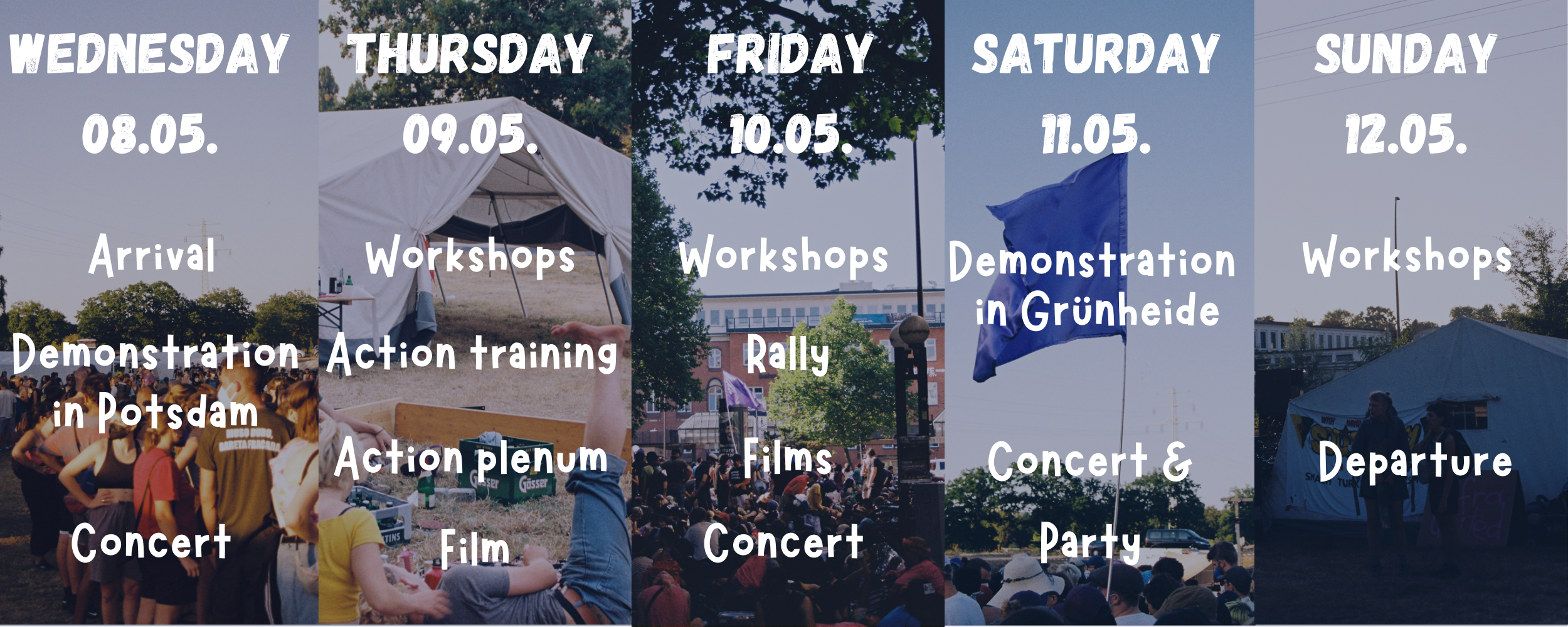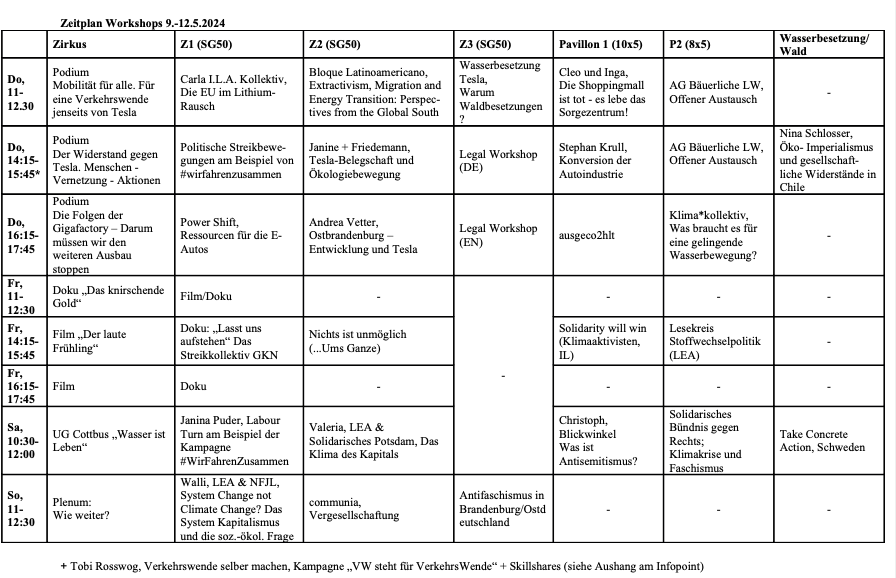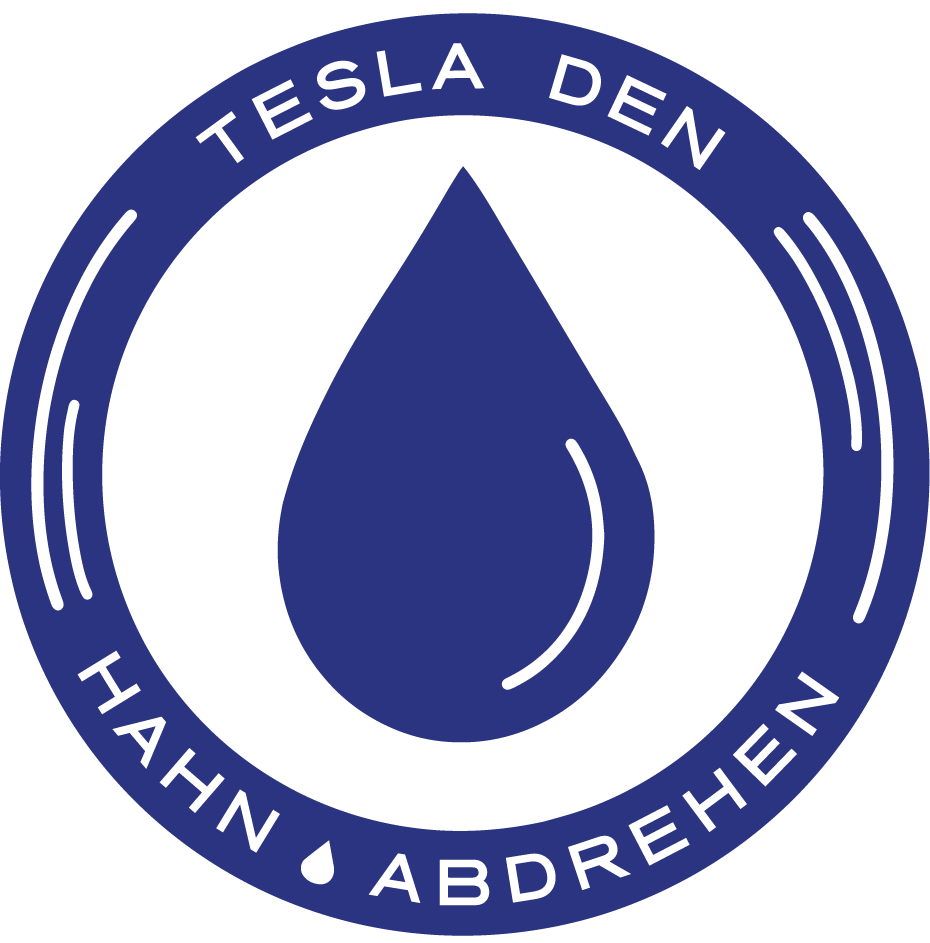
At the camp there will be many exciting workshops and discussions focusing on water, traffic & (auto)mobility, work and organization, extractivism, activist practice and utopias. The workshops and workshop times will be announced at the camp.
There will also be a great cultural program with concerts, films, readings and a party!
The exact program will be announced at the camp.
For more information about the different protest events, see protest.
If you still have questions about the program, you can reach us at: programm-wwg-camp@systemli.org
Workshops
…on the focal points of water, traffic & (auto)mobility, work & ecological-social conversion, theory, utopia & social criticism, extractivism, imperialism & resistance as well as movements & active practice
- and lots of skill shares! Contact the program organization at the info point with your offers.
- with translation DE-EN in two panel discussions, whisper translations as required and possible (please contact the translator collective), also self-organized
- Subject to change; The latest information at the info point in the camp
- also film program on Friday (see at the bottom)

Workshopdescriptions
-> please note that the following workshop descriptions have been translated using AI. Therefore errors might occur!!
Focus on water
Why forest occupations? I stop Tesla! Water and forest occupation
What have we learned from past forest occupations? How can forest occupations become part of our strategy?
Thursday, 11 a.m., workshop tent 3
Fight for water. The resistance against Tesla – people – networking – actions panel discussion with the BI Grünheide (see with English translation)
The presentation, followed by a discussion with activists, traces the development of the resistance from the first meetings of the critics, the first demonstrations to global networking and the coordination of the anti-Tesla actions. It becomes clear that this development has also done something to people. The location critics became people who advocate for a fair mobility transition, social justice and against capitalist growth worldwide
Moderation: Heiko; Sprecher*innen: Steffen, Manu, Heiko, Karolina, Nadine
Thursday, 2:15 p.m., Big Tent
The consequences of the Gigafactory – That’s why we have to stop further expansion Panel discussion with BI Grünheide (also with English translation)
The lectures explain the already serious consequences of the Tesla settlement for the region but also for the whole of Brandenburg: ecological damage, social upheaval as well as the reduction in trust in democratic processes and the rule of law. The changes in the party landscape are presented.
Moderation: Manu; Sprecher*innen: Heiko, Steffen, Steffi, Manu, Sven
Thursday, 4:15 p.m., Big Tent
„Water is life – coal is greed“. Water struggles in Lausitz I Environmental Group Cottbus
How do opencast mines affect the Spree and thus the drinking water of millions of people in Berlin and Brandenburg? What kind of resistance is there already? What is actually happening in Lusatia? Can the Spreewald still be saved? A short report followed by a discussion about the current fighting in Lusatia and how people can support.
Saturday, 10:30 a.m., Big Tent
Focus on traffic & (car) mobility
Mobility for everyone. For a transport transition beyond Tesla
Panel discussion with inputs from Katja Anclam, Anna Baatz and Annika Fuchs, moderated by Alex (SiG) Replacing combustion engines with expensive and environmentally harmful electric cars does not result in an ecological and social transport transition. This will only be possible with more public transport and fewer cars. In the future, everyone should be able to go wherever and whenever they want, even without their own car – regardless of where they live, how much they earn, how old they are and what gender they are. We want to discuss with you how this can work. KATJA ANCLAM is a mobility expert, managing director and head of communications and media at the German Institute for Good Life and talks about the possibilities of a transport transition in rural areas. With the Berlin Car Free referendum, ANNA BAATZ is fighting for a public welfare-oriented transport transition in the city and brings insights into the strengths and pitfalls of direct democratic processes. ANNIKA FUCHS is a mobility consultant at ROBIN WOOD. She advocates for mobility justice and asks how participation in mobility is possible for everyone, regardless of gender or financial resources.
Thursday, 11 a.m., Big Tent
„Nothing is impossible – about automotive capitalism and its end“ I TOP B3RLIN
It is clear to us that the means of production must be democratized and that the capitalist growth imperative must be replaced by a sensible organization of social production. It sounds like a difficult utopia to achieve, but it is the only realistic answer to the climate crisis. Rather, those who propagate business as usual are irrational and dreamy.“ – Representatives of the alliance ‚…ums Ganze!‘ present the brochure, which deals with the relationship between environmental destruction, automobility and capitalism
Friday, 2:15 p.m., workshop tent 2
++subject to change ++
Work & ecological-social conversion
Tesla workers and ecology movement – What separates us and what unites us?
Since the beginning of Tesla’s settlement in Grünheide fans and supporters, including the Brandenburg state government around Tesla fanboy Jörg Steinbach, have been arguing that it will create jobs. Criticism and demands from local residents, environmental and climate justice activists are predominantly met with this counter-argument and general praise of economic growth in „underdeveloped“ Brandenburg. Even within this neoliberal perspective, the argument is questionable in times of skills shortages, not to mention the necessary degrowth perspectives. Most Tesla workers are certainly aware of the ecological crisis and that we want to live together in an intact environment. However, there is also a great deal of criticism of the type of work: A lack of occupational safety and high sickness rates have been mentioned, as well as extreme pressure to conform and perform, and non-transparent promotions and dismissals. A large part of the workforce currently fears mass redundancies due to Tesla’s weak sales caused by the economic downturn.
In the workshop, we want to focus on the perspective of the workers and look for both differences and commonalities with the environmental and climate justice struggles. We will bring along stories and anecdotes from our activist and scientific work, but above all we want to enter into dialogue with the workshop participants. We see all participants as experts and are looking forward to the different perspectives that we bring with us through our diverse backgrounds. These we want to bring together and discuss.
Thursday, 2:15 p.m., workshop tent 2
Stop bowling alone, let’s strike together: Political strike movements using the example of #WirFahrenZusammen
After years of strategic searching, new branches of the climate movement are emerging. The #WeDriveTogether campaign relies on collaboration with the unions. What are the hurdles and potential of organizing in companies for building countervailing power for the climate movement? How to achieve the Climate Labor Turn that is so much talked about? By looking back at last year’s campaign experiences, we want to discuss what class struggle against the climate crisis can look like and what future alliances are conceivable.
Thursday, 2:15 p.m., workshop tent 1
Info, discussions, open exchange I AG Rural Agriculture (jABL)
about farming perspectives in general and in relation to water in particular
Thursday, 11 a.m. – 4 p.m., Pavilion 2
Conversion of the auto industry I Stephan Krull*
Crisis? What crisis are we talking about and what role does Tesla play in it? The conversion of the automotive industry to rail vehicle production is an industrial policy imperative and is the last chance for good work. On the role of the union and strategies for cooperation between the climate movement and the union.
Thursday, 2:15 p.m., Pavilion 1
Co-organizer: Linksjugend [’solid] Brandenburg *
Make your own traffic transition I Tobi Rosswog
Design colorful activities and creative campaigns together. It doesn’t take much for this. After a few actions from the last two years of the “VW stands for traffic transition” campaign are presented, we get into practice: what action idea do I have and how can it be implemented? Maybe we’ll see together what we can see at the finale of the Wolfsburg Festival on May 29th. at the invitation of the VW Annual General Meeting in Wolfsburg we can set up together in creative small groups. Let’s find out together.
Thursday, 2:15 p.m., location: See notice at the info point
Reading group “Metabolic Politics” I LEA
„It is above all work that creates our environment, for better or for worse. If we want to understand the causes of the ecological crisis, we must therefore put the world of work at the center of our attention.“ (Simon Schaupp, in: „Metabolic politics. Work, nature and the future of the planet“): A team member will connect people who want to study Stephan Schaupp’s new book together and will form a self-organized reading group.
Friday, 2:15 p.m., Pavilion 2
Labor turn the climate movement from “We drive together” to “We produce together”? I Janina Puder, climate and class* (Jena)
“We ride together” is the name of the alliance between FFF & Co., employees and the ver.di union to improve working and income conditions in local public transport (ÖPNV). The campaign makes it clear that climate activists are no longer willing to play off the climate movement and employees, social concerns and the fight against the climate catastrophe against each other. It has been shown that both are stronger when they stick together. But while there are great similarities between public transport workers and the demands of the climate movement, the hurdles for a joint fight between climate activists and industrial workers seem to be significantly higher. Nevertheless, the industry is of fundamental importance in terms of climate policy. The fight against the climate catastrophe cannot succeed without the fastest possible ecological restructuring and the dismantling of industry in some places. But here too it is said: This cannot be enforced at the expense of those working there. We are therefore faced with the dilemma that although social-ecological alliances are more than necessary in industry, the requirements for the formation of these are much higher. The workshop outlines the industry as a field of action for the climate movement and asks how social-ecological
Alliances can be built and successful. Together we want to discuss how we can move from „We drive together“ to a broad mobility transition campaign and how industry – especially the car industry – together with employees can be turned from centers of environmental destruction into future sectors of a social-ecological transport transition. We also want to critically discuss whether the labor turn in the climate movement has a future and what challenges climate activists face when it comes to further developing social-ecological alliances into an ecological workers‘ movement.
Saturday, 10:30 a.m., workshop tent 1
Co-organizer: Linksjugend [’solid] Brandenburg *
Theory, utopia & social criticism
The shopping mall is dead – long live the care center! I Cleo and Inga
Consumption is out, concern is in. Caring for each other and the planet belongs at the center of a post-capitalist and post-fossil economy and our neighborhoods. What do we need in our future care centers? We invite you to utopianize together and share our experience with the Sorge! To the ParkCenter.
Thursday, 11 a.m., Pavilion 1
The climate of capital I Valeria, LEA and Solidarity Potsdam
Marx is known for his comprehensive analysis of capitalist production. What may be less known is that the problem of natural exploitation plays a central role. Why is that? And (why) is it still relevant for us to deal with it today? We want to discuss these questions together using passages from Capital.
Saturday, 10:30 a.m., workshop tent 2
Jews and cyclists rule the world. Why cyclists? What is anti-Semitism and how does it relate to racism? I Christoph, perspective e. v.
Actually, it could be that simple: anti-Semitism and racism are both anti-human attitudes that everyone must fight together. But even if the two are historically closely linked, anti-Semitism functions somewhat differently than racism and differences between the historical and theoretical references of criticism of racism and anti-Semitism often lead to arguments and trench warfare with mutual exclusions, relativizations and accusations. This workshop is intended to address practically and theoretically the characteristics of anti-Semitism as well as its similarities and differences to racism and also examine the question of whether and how these two struggles, which actually belong together, can also be thought of and implemented together.
Saturday, 10:30 a.m., Pavilion 1
Climate crisis and fascism I Solidarity alliance against the right
While ecosystems are being destroyed and natural resources are becoming scarce in the wake of the climate crisis, nationalists are on the rise in Europe. Not only is Fortress Europe continually being expanded, legal migration is being restricted worldwide and the rights of migrants and refugees are being massively curtailed. In this lecture we want to ask ourselves why crises of global proportions lead to an upsurge in nationalist responses and why Antifa and the climate justice movement belong together.
As part of the lecture, the Solidarity Alliance Against Right Berlin, which supports anti-fascists in East Germany in the fight against the AfD, will also introduce itself.
Saturday, 10:30 a.m., Pavilion 2
System change not climate change? The system of capitalism and the social-ecological crisis I
Walli, LEA & Nature Friends Youth Leipzig*
We want to look at the connections between ecology, economy and society. What is the social-ecological crisis we are in and its causes? We take a look at the concepts of ‘society’ and ‘nature’, the history of the emergence of capitalism and its basic functional mechanisms. It becomes clear why capitalist commodity production must continue to grow and why companies, the state and politics must follow this growth imperative. In the end there is always the question of what we can do. System change instead of climate change? Or is it already the end of the road when it comes to climate?
Sunday, 11 a.m., workshop tent 1
Co-organizer: Linksjugend [’solid] Brandenburg *
Socialization and public luxury I communia
For the economy to serve us all, it must belong to all of us. For public luxury, mobility must be climate-friendly, democratically organized and available to everyone. Expropriating Elon Musk and socializing the mobility sector are necessary steps to break the destructive property system. But what does the socialization article in the Basic Law actually mean? How can we use socialization for a democratic economy? And what does that mean specifically for Tesla and the mobility sector.
Sunday, 11 a.m., workshop tent 2
Extractivism, Imperialism & Resistance
The EU in a lithium frenzy – Green sacrifice zones on the edges of Europe I Carla, I.L.A. Collective
In times of global supply chain problems, the EU wants to secure the supply of lithium for its automotive industry. New mining projects are sprouting up like poisonous mushrooms on the edges of Europe. Politicians and industry say: Triple lottery win – for economic growth, for geopolitical independence and for sustainability. But there is protest in the regions.
In this workshop we will look together at the current political context of European raw materials policy, get an overview of the newly emerging lithium protest regions in Europe and then zoom in on Spain: What and how are the people there defending themselves? Why do you talk about green sacrifice zones? And for whom is the new lithium rush a lottery win?
Thursday, 11 a.m., workshop tent 1
Eco-imperialism and social resistance in Chile I Nina Schlosser (LAG Climate Justice The Left)
The prevailing production and consumption patterns in capitalist countries like Germany are exacerbating the global climate crisis. However, the electrification of automobility as the dominant decarbonization strategy not only blocks the good life for all in this country, but also destroys nature in raw material exporting countries and deepens centuries-old hierarchical, neo-colonial and racialized power and domination relationships.
Using the example of Chile, the main lithium supplier to both the federal government and the EU, we take a look at how the ruling powers, including state actors and car manufacturers, secure this unequal exchange despite social resistance. A theory of hegemony
Informed contemporary diagnosis makes it clear how powerful discourses, everyday practices, (infra)structures and institutions are that secure an “imperial way of life” – at the expense of others. At the same time, it shows us where we can tackle the green capitalist system by its roots in order to transform it collectively. We’ll think about it together.
Thursday, 2:15 p.m., water occupation
Extractivism, Migration and Energy Transition: Perspectives from the Global South (EN) I Orsi & Dani, Bloque Latinoamericano Berlin
The workshop seeks to discuss the interconnections of extractivism from the south to the north with the dynamics of worker migration and their labor rights. It also seeks to analyze how the “green” energy transition is taking place at the expense of the global south and with environmental consequences for all.
Extractivism, Migración y Transición Energética: Perspectivas desde el Sur Global (Español)
El taller pretende debatir las interconexiones del extractivismo del sur al norte with las dinámicas de la migration de trabajadores y sus derechos laborales. También pretende analizar cómo the transición energetica „verde“ se está produciendo a costa del sur global y cone conecuencias medioambientales para todos.
Thursday, 2:15 p.m., workshop tent 2
Do electric cars save the climate? Are you kidding me? Are you serious when you say that! I Vanessa, PowerShift
E-cars are considered a climate-friendly alternative to combustion engines. A lot of resources are used to produce them. And the raw materials for the batteries are often mined under catastrophic conditions. In the workshop, participants not only learn how much aluminum, copper, etc. are in the batteries, but also what electric cars have to do with land grabs, toxic mudslides and loss of biodiversity.
Thursday, 4:15 p.m., workshop tent 1
Water struggles in motion I Timo, Climate*Collective*
What does it take for successful water movement? Where are hotspots and what challenges and opportunities do we face? After an input from Timo from Klima*Kollektiv (co-editor of the zine “Water Fights in Motion”), we would like to discuss these questions together.
Thursday, 4:15 p.m., Pavilion 2
Co-organizer: Linksjugend [’solid] Brandenburg *
Movements & activist practice
Regional development from below? I Andrea Vetter
Brandenburg and especially East Brandenburg is developing into a model region for green capitalism. Eastern Brandenburg is currently being actively branded by regional politicians as the “Oderland Spree economic region” and “East metropolitan region” in order to use the “Tesla effect” and attract further investors and designate industrial areas. Behind this lies the narrative that only economic growth creates prosperity and quality of life and therefore a green industrialization of Brandenburg is for the benefit of everyone. The massive distribution conflicts over land and water are ignored. But there is also an opposite regional development from below in East Brandenburg: local open space places are joining together to form commons networks and developing new Models for a queer-feminist, subsistence and anti-fascist region. How can this vision for a good life for all be developed and spread from below for the region?
Thursday, 4:15 p.m., workshop tent 2
Long-term activism in the fight against the climate crisis and global injustices I Balanced
We are all trying really hard, doing great and important activist work and have already achieved a bit as a movement in recent years. But if we’re honest, we’re not going to leave the problems we want to solve behind us any time soon. This can really take the wind out of our sails individually and as groups and as a whole movement. It presents us with the challenge of how we deal with hopelessness and overwork and also how we can shape our long-term lives in which there is room for activism without neglecting other important things.
In this workshop we want to deal with individual and collective strategies for long-term activism. If you are interested, we will also create an exchange space about how we (could) finance our lives.
Thursday, 4:15 p.m., Pavilion
Solidarity wants to win / A guide for climate activists
„You also have the feeling that the world cannot stay as it is? You want to actively make a difference? Then: Let’s organize! I Interventionist Left
Thousands of people came together in the disputes over the Hambach Forest. Together we managed to stand up to a huge corporation like RWE. If we come together, we can make a difference. Of course you can join an existing group (e.g. the Interventionist Left), but a vibrant movement is based on many active local groups. Meet up with friends, invite them to an open meeting and implement your own ideas. People from iL present their organizing brochure (if they are not otherwise involved).
Friday, 2:15 p.m., Pavilion 1
++subject to change ++
Infotalk: Mass Action and Climate Camp in Sweden Summer 2024 I Take Concrete Action, Sweden
Members from the radical climate network Take Concrete Action talk about the current state of the Swedish forestry industry and how it affects both ecology and politics. They then present their plans for a climate camp and mass action in Sweden in June!
Saturday, 10:30 a.m., water occupation
Antifascism in Brandenburg/East Germany I N.N.
Details on site in the camp
Sunday, 11 a.m., workshop tent 3
Plenum “What next?”
What should happen after camp? How do we want to stay connected, build on what we have created, how do our struggles continue to connect? We want to discuss this together.
Sunday, 11 a.m., Big Tent
FILM PROGRAM
The Crunching Gold (2023)
Language: German
The film “Crunching Gold” highlights the dark side of gravel mining for nature and people using concrete examples in the Rhine-Main area! There is valuable sand underground there. In our profit-oriented world, sand is mined ever faster and little consideration is given to nature. Valuable forests are to give way to gravel mining, even though we urgently need them in the fight against climate change and to supply drinking water to the metropolitan region.
Friday: 11:00 a.m. Big Tent
The Loud Spring (2024)
Language: German/English with English subtitles
The global climate movement is increasingly realizing that things cannot continue like this and that we need a system change. In „The Loud Spring“ we use animated sequences to look into the future and describe what the profound social transformation we need could look like.
Friday 2:15 p.m. Big tent
Let’s get up! – The factory collective GKN (2022)
Italian with German subtitles
422 workers at an auto parts factory in Campi Bisenzio near Florence were dismissed without notice in July 2021. Since then, they have occupied the factory, organized various events and demonstrations with tens of thousands of people, and launched a fundraising campaign. Their goal: They want to convert their workplace into an eco-socialist factory that is run by the workers themselves and produces solar panels or cargo bikes. But they also talk about their collaboration with climate activists and what they would like to produce. Also about the fact that, as things stand, the workers are not responsible for the ecological damage that production causes:
„No one asked me what I would like to produce when they hired me. They hired me and that’s it.“ (from the video)
Friday 2:15 p.m. WS Tent 1
LÜTZERATH – together for a good life
Cinema Movieland Erkner
Thursday May 9th, 7:00 p.m.
marked with *: co-organizer Linksjugend [’solid] Brandenburg


